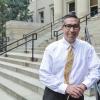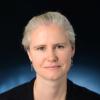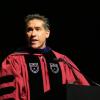Clint Talbott
 Francis Beckwith, the 2016-17 Visiting Scholar in Conservative Thought and Policy, is now on campus teaching courses, arranging the appearance of guest speakers on campus. Beckwith fielded five questions about his book, his appointment and the state of political discourse.
Francis Beckwith, the 2016-17 Visiting Scholar in Conservative Thought and Policy, is now on campus teaching courses, arranging the appearance of guest speakers on campus. Beckwith fielded five questions about his book, his appointment and the state of political discourse. Professor Lori M. Hunter has spent a semester prompting students to grapple with questions about the intersection of society and yoga. The course, which she believes is the first of its kind, is an upper-division class designed to hone students’ critical-thinking skills.
Professor Lori M. Hunter has spent a semester prompting students to grapple with questions about the intersection of society and yoga. The course, which she believes is the first of its kind, is an upper-division class designed to hone students’ critical-thinking skills. Two first graders walk into a class. They open a science book they wrote together. They read it aloud to college students, who clap and ask questions. This is no joke. It’s a joint effort of a science-writing class at CU-Boulder and a first-grade class at Bear Creek Elementary School.
Two first graders walk into a class. They open a science book they wrote together. They read it aloud to college students, who clap and ask questions. This is no joke. It’s a joint effort of a science-writing class at CU-Boulder and a first-grade class at Bear Creek Elementary School. Jackie Elliott, associate professor of classics at the University of Colorado Boulder, has won a 2016 Goodwin Award of Merit from the Society for Classical Studies, the nation’s top research recognition in classical languages & literature. Elliott was recognized for her book, Ennius and the Architecture of the Annales.
Jackie Elliott, associate professor of classics at the University of Colorado Boulder, has won a 2016 Goodwin Award of Merit from the Society for Classical Studies, the nation’s top research recognition in classical languages & literature. Elliott was recognized for her book, Ennius and the Architecture of the Annales. In the headlines, the words “humanities” and “crisis” are so commonly conjoined that you’d think that college courses on human thought, experience and creativity are collapsing like the Roman Empire. The story has more nuance than the headline, as the Classics Department illustrates.
In the headlines, the words “humanities” and “crisis” are so commonly conjoined that you’d think that college courses on human thought, experience and creativity are collapsing like the Roman Empire. The story has more nuance than the headline, as the Classics Department illustrates. Alla Balabanova describes her time at CU‐Boulder as “anything but easy,” adding that she faced obstacles “just about every step of the way,” starting with her
Alla Balabanova describes her time at CU‐Boulder as “anything but easy,” adding that she faced obstacles “just about every step of the way,” starting with her
initial uncertainty about what to study. That might not sound like a ringing endorsement, but it is. Balabanova graduated summa cum laude in biochemistry and was the Fall 2015 outstanding graduate of the College of Arts and Sciences. The Program in Nordic Studies has begun offering Finnish‐language courses at the University of Colorado Boulder. It’s noteworthy because it’s such a rare language, and the courses are offered for full credit, which means the courses can satisfy a foreign‐language requirement.
The Program in Nordic Studies has begun offering Finnish‐language courses at the University of Colorado Boulder. It’s noteworthy because it’s such a rare language, and the courses are offered for full credit, which means the courses can satisfy a foreign‐language requirement. Francis Beckwith will serve as the Visiting Scholar in Conservative Thought and Policy for the 2016-17 academic year. He is the fourth person to hold the position.
Francis Beckwith will serve as the Visiting Scholar in Conservative Thought and Policy for the 2016-17 academic year. He is the fourth person to hold the position. Strong and light carbon-fiber composites can be easily and cost-effectively recycled into new material just as strong as the originals, a team of researchers led by CU-Boulder has found. The composites are popular because they are lighter than aluminum and stronger than steel. Unlike metal, however, carbon-fiber composite is generally not recyclable.
Strong and light carbon-fiber composites can be easily and cost-effectively recycled into new material just as strong as the originals, a team of researchers led by CU-Boulder has found. The composites are popular because they are lighter than aluminum and stronger than steel. Unlike metal, however, carbon-fiber composite is generally not recyclable. Pregnant and postpartum women at risk of depression are less likely to suffer depression when they meditate or get in a yoga pose than when they are treated with psychotherapy or antidepressants, a study led by CU-Boulder researchers has found.
Pregnant and postpartum women at risk of depression are less likely to suffer depression when they meditate or get in a yoga pose than when they are treated with psychotherapy or antidepressants, a study led by CU-Boulder researchers has found.

